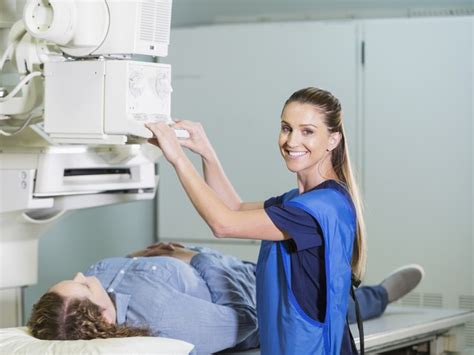A career as a radiology technologist can be both rewarding and challenging. These professionals play a critical role in the medical field, utilizing imaging technologies to help diagnose and treat a wide range of medical conditions. However, for individuals with a misdemeanor conviction, pursuing a career as a radiology technologist may be more complicated.
The impact of a misdemeanor conviction on a career as a radiology technologist depends on various factors, including the nature of the offense, the state in which you wish to practice, and the specific employer or institution. In this article, we will explore the potential effects of a misdemeanor conviction on a career as a radiology technologist and provide guidance on how to navigate this challenging situation.
Can a Misdemeanor Conviction Prevent You from Becoming a Radiology Technologist?
A misdemeanor conviction may not necessarily prevent you from becoming a radiology technologist, but it can create obstacles. The primary concern is whether the conviction is related to the profession or poses a risk to patient safety.
In the United States, the American Registry of Radiologic Technologists (ARRT) is the primary certifying organization for radiology technologists. The ARRT has a policy of considering the moral character of applicants, which includes evaluating any criminal convictions.
When applying for certification, you will be required to disclose any criminal convictions, including misdemeanors. The ARRT will review the conviction and consider the following factors:
- The nature of the offense: Was the conviction related to a crime of moral turpitude, such as theft, dishonesty, or violence?
- The severity of the offense: Was the conviction a felony or misdemeanor, and what was the sentence imposed?
- The time elapsed since the conviction: Has sufficient time passed since the conviction to demonstrate rehabilitation?
- The applicant's honesty and disclosure: Did the applicant disclose the conviction truthfully and promptly?

If the ARRT determines that the misdemeanor conviction is not a significant concern, you may still be eligible for certification. However, if the conviction is deemed a risk to patient safety or reflects poorly on your moral character, your application may be denied.
State Licensing and Misdemeanor Convictions
In addition to ARRT certification, radiology technologists must also comply with state licensing requirements. While certification is not mandatory in all states, many states require licensure to practice as a radiology technologist.
State licensing boards may have their own policies regarding misdemeanor convictions. Some states may automatically deny licensure for certain types of convictions, while others may consider the circumstances surrounding the offense.
It is essential to research the specific licensing requirements in your state and understand how a misdemeanor conviction may impact your eligibility.
Types of Misdemeanor Convictions That May Impact Your Career
Certain types of misdemeanor convictions may be more likely to impact your career as a radiology technologist. These include:
- Crimes of moral turpitude: Offenses such as theft, dishonesty, or violence may be considered crimes of moral turpitude, which can raise concerns about your trustworthiness and ability to work with patients.
- Substance abuse: Convictions related to substance abuse or addiction may raise concerns about your ability to perform your duties safely and effectively.
- Crimes involving patients or vulnerable populations: Convictions related to the abuse or neglect of patients, children, or other vulnerable populations may be considered particularly serious and may impact your eligibility for certification or licensure.

Navigating a Misdemeanor Conviction as a Radiology Technologist
If you have a misdemeanor conviction and are interested in pursuing a career as a radiology technologist, it is essential to take proactive steps to address the situation. Here are some tips to help you navigate this challenging situation:
- Disclose the conviction: Be truthful and transparent about the conviction when applying for certification or licensure. Failing to disclose the conviction can lead to more severe consequences.
- Provide context: Explain the circumstances surrounding the conviction and provide any relevant documentation or character references.
- Demonstrate rehabilitation: Show that you have learned from the experience and taken steps to rehabilitate yourself. This may include completing a rehabilitation program, volunteering, or pursuing additional education or training.
- Seek guidance: Consult with a career counselor or a professional organization, such as the ARRT, to understand the specific requirements and challenges you may face.
- Consider alternative careers: If you are unable to overcome the obstacles posed by a misdemeanor conviction, consider alternative careers in the healthcare field that may be less impacted by the conviction.
Conclusion
A misdemeanor conviction can create challenges for individuals pursuing a career as a radiology technologist. However, with careful planning, transparency, and a commitment to rehabilitation, it is possible to overcome these obstacles and build a successful career in this field.
By understanding the potential impact of a misdemeanor conviction and taking proactive steps to address the situation, you can increase your chances of success and build a rewarding career as a radiology technologist.






Can I still become a radiology technologist with a misdemeanor conviction?
+It depends on the nature of the offense, the state in which you wish to practice, and the specific employer or institution. Some misdemeanors may not impact your eligibility, while others may raise concerns about patient safety or your moral character.
What types of misdemeanor convictions may impact my career as a radiology technologist?
+Crimes of moral turpitude, substance abuse, and crimes involving patients or vulnerable populations may be more likely to impact your career as a radiology technologist.
How can I overcome a misdemeanor conviction and build a successful career as a radiology technologist?
+Disclose the conviction truthfully, provide context, demonstrate rehabilitation, and seek guidance from a career counselor or professional organization. Consider alternative careers in the healthcare field if necessary.
